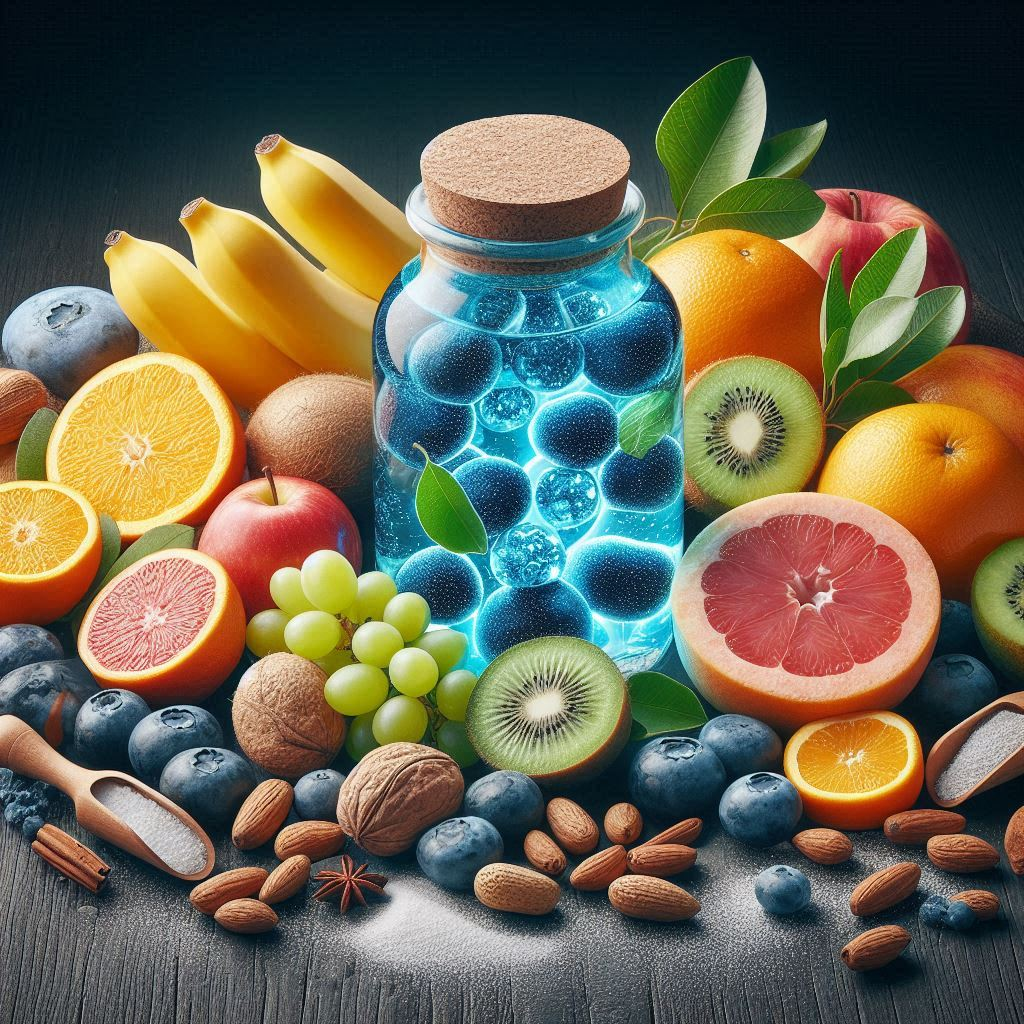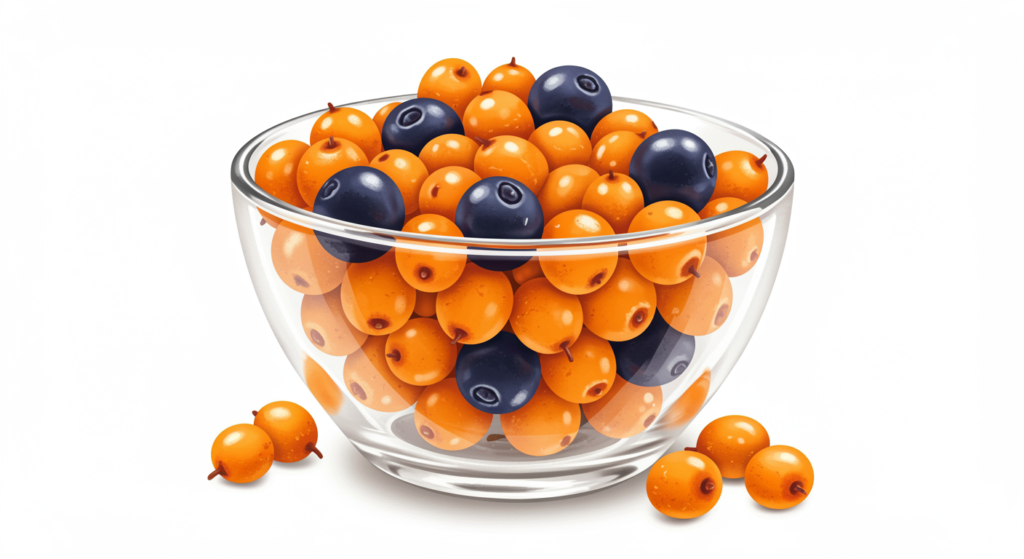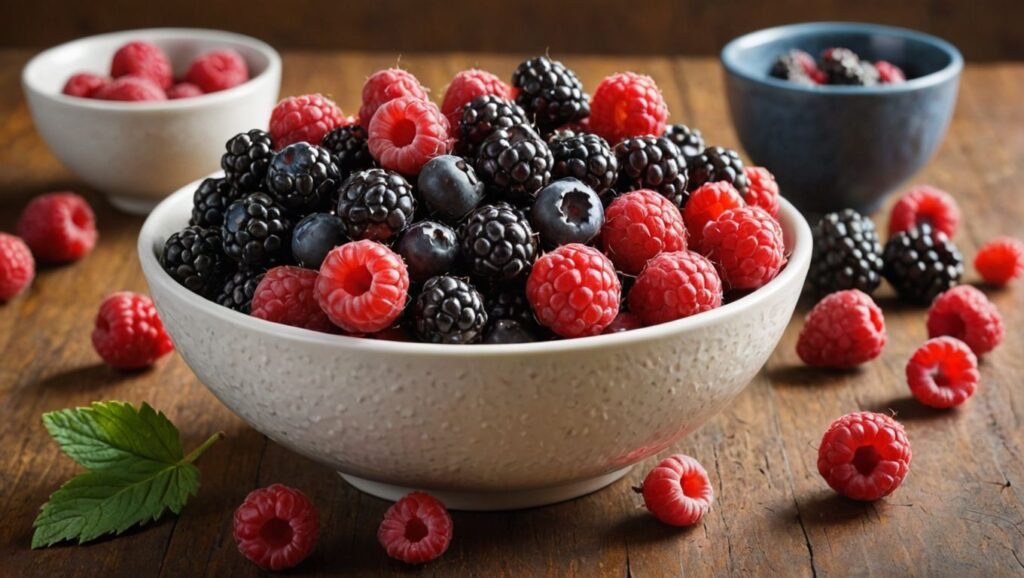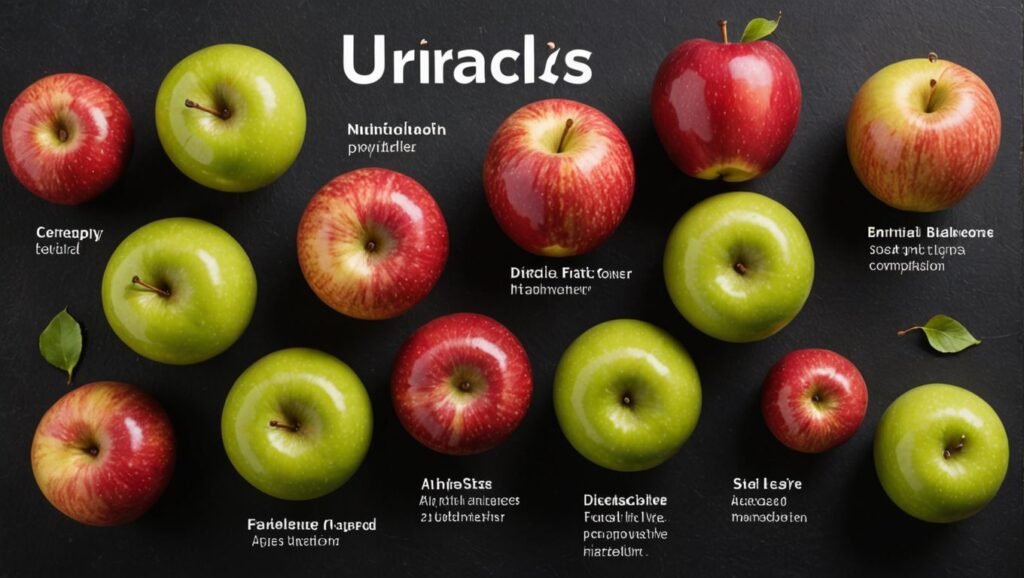
“5 Powerful Fruits to Reduce Uric Acid Effectively”
Powerful fruits naturally lower uric acid for better health. Discover 5 powerful fruits to add to your diet and manage uric acid effectively. 🍒🍍🍊🍎🍇


Introduction
Uric acid is a waste product formed from the breakdown of purines, which are found in certain foods and drinks. High levels of uric acid can lead to gout, a painful form of arthritis. Managing uric acid levels is crucial for overall health, and certain fruits can help reduce uric acid naturally. This article will explore five powerful fruits that can effectively lower uric acid levels and improve your well-being.
1. Cherries
Cherries are rich in antioxidants and anti-inflammatory compounds, which can help reduce uric acid levels and prevent gout flare-ups.
- Nutritional Profile: Overview of the vitamins, minerals, and antioxidants found in cherries.
- Scientific Evidence: Studies demonstrating the effectiveness of cherries in reducing uric acid levels.
- Practical Tips: How to incorporate cherries into your diet, including fresh, dried, or as juice.
Cherries: Nutritional Values and Health Effects
Nutritional Profile of Cherries: Cherries are not only delicious but also packed with essential nutrients. Here’s a breakdown of the nutritional values for a 1-cup (138 g) serving of sweet, raw cherries without pits:
- Calories: 87
- Carbohydrates: 22g
- Fiber: 3g
- Sugars: 17.7g
- Protein: 1.4 g
- Vitamin C: 9.7 mg (16% of the Daily Value)
- Potassium: 306 mg (9% of the Daily Value)
- Calcium: 17.9 mg (2% of the Daily Value)
- Magnesium: 15.2 mg (4% of the Daily Value)
- Iron: 0.6 mg (3% of the Daily Value)
- Phosphorus: 10.8 mg (1% of the Daily Value)
Health Effects of Cherries: Cherries offer a range of health benefits due to their rich nutrient profile and high antioxidant content. Here are some key health effects:
- Reduces Inflammation and Pain: Cherries contain anti-inflammatory compounds like anthocyanins and flavonoids, which help reduce inflammation and pain. This makes them beneficial for conditions like arthritis and gout.
- Improves Sleep Quality: Cherries are one of the few natural sources of melatonin, a hormone that regulates sleep-wake cycles. Consuming cherries or cherry juice can help improve sleep quality and duration.1.
- Supports Heart Health: The antioxidants in cherries help combat oxidative stress, which can reduce the risk of heart disease. Cherries also contain potassium, which supports healthy blood pressure levels.2.
- Aids Exercise Recovery: The anti-inflammatory and antioxidant properties of cherries can speed up recovery after exercise. Tart cherry juice, in particular, has been shown to reduce muscle soreness and improve recovery times.2.
- Promotes Overall Health: Cherries are rich in vitamins, minerals, and antioxidants that contribute to overall health. They support immune function and skin health and may even help prevent certain chronic diseases.
- Reduces Uric Acid Levels: Cherries have been studied for their ability to reduce uric acid levels in the blood, which can help prevent gout attacks. Regular consumption of cherries can help manage uric acid levels and reduce the risk of gout flare-ups.
- Supports Brain Health: The antioxidants in cherries may help protect brain cells from damage and improve cognitive function. Some studies suggest that cherries may help reduce the risk of Alzheimer’s disease and other neurodegenerative conditions.
- Aids Digestion: The fiber content in cherries promotes healthy digestion and can help prevent constipation. Fiber also supports a healthy gut microbiome, which is essential for overall health.
- Boosts Immune System: The vitamin C in cherries helps boost the immune system, protecting the body against infections and illnesses.
- Enhances Skin Health: The antioxidants in cherries help combat free radicals, which can cause skin damage and aging. Regular consumption of cherries can contribute to healthier, more youthful-looking skin.
Incorporating cherries into your diet can provide numerous health benefits, from reducing inflammation and pain to improving sleep quality and supporting heart health. Whether you enjoy them fresh, dried, or as juice, cherries are a delicious and nutritious addition to any diet.
Ways to Include Cherries in Your Meals
1. Fresh Snack:
- Simply enjoy fresh cherries as a snack. Wash them thoroughly and enjoy them whole or pitted. They make a refreshing and healthy option to curb your cravings.
2. Smoothies:
- Add cherries to your morning smoothie for a burst of flavor and nutrition. Combine them with other fruits like bananas, berries, and spinach for a nutrient-packed drink.
3. Salads:
- Toss cherries into your salads for a sweet and tangy twist. Pair them with greens like arugula, spinach, or kale, and add nuts, cheese, and a balsamic vinaigrette.
4. Desserts:
- Use cherries in desserts such as pies, tarts, and cobblers. They add natural sweetness and color to your treats. You can also make cherry compote to top yogurt or ice cream.
5. Breakfast:
- Mix cherries into your breakfast cereals, oatmeal, or yogurt. They provide a delicious and healthy start to your day.
6. Jams and Preserves:
- Make cherry jam or preserves to spread on toast or use as a filling in pastries. Homemade cherry preserves are a delightful way to enjoy the fruit year-round.
7. Sauces and Marinades:
- Incorporate cherries into sauces and marinades for meats and poultry. A cherry glaze or sauce can complement dishes like pork, duck, and chicken.
8. Beverages:
- Make cherry juice or cherry-infused water for a refreshing drink. You can also add cherries to cocktails and mocktails for a fruity twist.
9. Baking:
- Add dried or fresh cherries to baked goods such as muffins, scones, and bread. They enhance the flavor and add a nutritional boost.
10. Frozen Treats:
- Freeze pitted cherries and enjoy them as a cool treat on hot days. You can also blend them into frozen yogurt or sorbet.
Additional Specific Benefits of Cherries
1. Anti-Cancer Properties:
- Cherries contain antioxidants like quercetin and anthocyanins, which have been shown to have anti-cancer properties. These compounds help neutralize free radicals that can cause cellular damage and lead to cancer.
2. Blood Sugar Regulation:
- Cherries have a low glycemic index, making them suitable for people with diabetes. They can help regulate blood sugar levels and prevent spikes.
3. Anti-Aging Effects:
- The antioxidants in cherries help combat signs of aging by reducing oxidative stress and promoting collagen production. This can lead to healthier and more youthful-looking skin.
4. Joint Health:
- Cherries have anti-inflammatory properties that can help reduce symptoms of arthritis and improve joint health. Regular consumption can alleviate joint pain and stiffness.
5. Eye Health:
- The vitamin A and beta-carotene in cherries contribute to good vision and eye health. These nutrients help protect the eyes from damage caused by free radicals.
By incorporating cherries into your diet in various creative ways, you can enjoy their delicious taste and numerous health benefits. Whether you eat them fresh, blend them into smoothies, or use them in desserts, cherries are a versatile and nutritious addition to any meal.
2. Berries
Berries such as strawberries, blueberries, and raspberries are packed with vitamin C and antioxidants, which can help lower uric acid levels and reduce inflammation.
- Nutritional Profile: The health benefits of various types of berries.
- Scientific Evidence: Research supporting the role of berries in uric acid reduction.
- Practical Tips: Ideas for adding berries to your meals, including smoothies, salads, and snacks.
Berries: Nutritional Values, Health Benefits, and Ways to Include Them in Your Meals
Nutritional Profile of Berries Berries are a nutrient-dense fruit group, offering a variety of vitamins, minerals, and antioxidants. Here are the nutritional values of some common types of berries per 1 cup (approximately 150 g):
- Strawberries
- Calories: 49
- Carbohydrates: 11.7g
- Fiber: 3g
- Sugars: 7.4g
- Protein: 1g
- Vitamin C: 89.4 mg (149% of the Daily Value)
- Potassium: 233 mg (7% of the Daily Value)
- Folate: 40.2mcg (10% of the Daily Value)
- Blueberries
- Calories: 84
- Carbohydrates: 21.4g
- Fiber: 3.6 g
- Sugars: 14.7g
- Protein: 1.1 g
- Vitamin C: 14.4 mg (24% of the Daily Value)
- Vitamin K: 28.6mcg (36% of the Daily Value)
- Manganese: 0.5 mg (25% of the Daily Value)
- Raspberries
- Calories: 64
- Carbohydrates: 14.7g
- Fiber: 8g
- Sugars: 5.4g
- Protein: 1.5 g
- Vitamin C: 32.2 mg (54% of the Daily Value)
- Vitamin K: 9.6mcg (12% of the Daily Value)
- Manganese: 0.8 mg (41% of the Daily Value)
- Blackberries
- Calories: 62
- Carbohydrates: 13.8g
- Fiber: 7.6 g
- Sugars: 7g
- Protein: 2g
- Vitamin C: 30.2 mg (50% of the Daily Value)
- Vitamin K: 28.5mcg (36% of the Daily Value)
- Manganese: 0.9 mg (47% of the Daily Value)
Health Benefits of Berries
- Rich in Antioxidants
- Berries are packed with antioxidants like anthocyanins, flavonoids, and resveratrol, which help protect the body from oxidative stress and reduce inflammation.
- Boosts Heart Health
- Consuming berries regularly can improve heart health by lowering blood pressure, reducing cholesterol levels, and preventing the formation of blood clots.
- Supports Brain Health
- The antioxidants in berries can help improve cognitive function and reduce the risk of neurodegenerative diseases like Alzheimer’s and Parkinson’s.
- Aids in Weight Management
- Berries are low in calories but high in fiber, which helps you feel full longer and can aid in weight management.
- Improves Digestive Health
- The high fiber content in berries supports healthy digestion and prevents constipation. Fiber also promotes a healthy gut microbiome.
- Enhances Skin Health
- The vitamins and antioxidants in berries help protect the skin from damage, reduce signs of aging, and promote a healthy complexion.
- Supports Immune System
- The vitamin C in berries boosts the immune system, helping the body fight off infections and illnesses.
- Reduces Inflammation
- Berries have anti-inflammatory properties that can help reduce symptoms of arthritis and other inflammatory conditions.
- Manages Blood Sugar Levels
- The fiber in berries slows down the digestion of sugars, helping to regulate blood sugar levels and prevent spikes.
- Protects Against Cancer
- Some studies suggest that the antioxidants in berries may help prevent certain types of cancer by protecting cells from damage.
Ways to Include Berries in Your Meals
- Breakfast Boost
- Add berries to your breakfast cereals, oatmeal, or yogurt for a nutritious and flavorful start to your day.
- Smoothies and Shakes
- Blend berries into smoothies or shakes with other fruits, vegetables, and a protein source for a refreshing and healthy drink.
- Salads
- Toss berries into your salads for a burst of color and sweetness. They pair well with greens, nuts, and cheese.
- Snacks
- Enjoy berries as a healthy snack on their own or mix them with nuts and seeds for a satisfying and nutrient-dense snack.
- Desserts
- Use berries in desserts such as pies, tarts, and parfaits. They add natural sweetness and vibrant color to your treats.
- Sauces and Jams
- Make berry sauces or jams to spread on toast, pancakes, or waffles. You can also use them as a topping for ice cream or desserts.
- Frozen Treats
- Freeze berries and enjoy them as a cool treat on hot days. You can also blend them into frozen yogurt or sorbet.
- Infused Water
- Add berries to your water for a refreshing and flavored drink. You can also use them in cocktails and mocktails.
- Baking
- Incorporate berries into baked goods such as muffins, scones, and bread. They enhance the flavor and provide added nutrients.
- Savory Dishes
- Experiment with adding berries to savory dishes, such as using them in sauces for meats or adding them to grain bowls.
By including berries in your diet in various creative ways, you can enjoy their delicious taste and numerous health benefits. Whether you eat them fresh, blend them into smoothies, or use them in desserts, berries are a versatile and nutritious addition to any meal

3. Apples:
Apples are high in fiber, vitamin C, and antioxidants, making them an excellent fruit for reducing uric acid levels.
- Nutritional Profile: Detailed breakdown of the nutrients in apples.
- Scientific Evidence: Studies showing how apples can help manage uric acid levels.
- Practical Tips: Suggestions for eating apples, such as raw, in salads, or as part of desserts.
Apples: Nutritional Value, Health Benefits, and Ways to Include Them in Your Meals
Nutritional Profile of Apples
Apples are a popular fruit known for their crisp texture and sweet-tart flavor. They are not only delicious but also packed with essential nutrients. Here are the nutritional values for a medium-sized apple (about 182 grams):
- Calories: 95
- Carbohydrates: 25g
- Fiber: 4.4 g (17% of the Daily Value)
- Sugars: 19g
- Protein: 0.5g
- Vitamin C: 8.4 mg (14% of the Daily Value)
- Potassium: 195 mg (5% of the Daily Value)
- Vitamin K: 4mcg (5% of the Daily Value)
- Folate: 5mcg (1% of the Daily Value)
- Vitamin A: 98IU (2% of the Daily Value)
- Magnesium: 9 mg (2% of the Daily Value)
Health Benefits of Apples
- Rich in Fiber:
- Apples are high in dietary fiber, which aids in digestion, helps regulate blood sugar levels, and promotes a feeling of fullness, making them a great option for weight management.
- Packed with Antioxidants:
- Apples contain antioxidants such as quercetin, catechin, and chlorogenic acid, which help combat oxidative stress and reduce inflammation.
- Supports Heart Health:
- The soluble fiber in apples can help lower cholesterol levels, while the potassium content supports healthy blood pressure. Regular consumption of apples is associated with a reduced risk of heart disease.
- Aids in Weight Management:
- Due to their high fiber and low-calorie content, apples can help with weight management by promoting a feeling of fullness and reducing overall calorie intake.
- Boosts Immune System:
- Apples are a good source of vitamin C, which boosts the immune system and helps the body fight off infections and illnesses.
- Improves Gut Health:
- The fiber in apples supports healthy digestion and helps maintain a healthy gut microbiome. Pectin, a type of soluble fiber found in apples, acts as a prebiotic, feeding beneficial gut bacteria.
- Supports Brain Health:
- Some studies suggest that the antioxidants in apples may help protect brain cells from oxidative stress and reduce the risk of neurodegenerative diseases such as Alzheimer’s.
- Promotes Healthy Skin:
- The vitamins and antioxidants in apples contribute to healthy skin by reducing signs of aging and protecting against damage caused by free radicals.
- Regulates Blood Sugar Levels:
- The fiber in apples slows down the digestion of sugars, helping to regulate blood sugar levels and prevent spikes.
- Hydration:
- Apples have a high water content, contributing to overall hydration and helping to maintain electrolyte balance.
Ways to Include Apples in Your Meals
- Fresh Snack:
- Enjoy apples as a convenient and healthy snack. Eat them whole or slice them up and pair with peanut butter or cheese for added protein and healthy fats.
- Salads:
- Add apple slices to your salads for a sweet and crunchy addition. They pair well with greens, nuts, cheese, and vinaigrette dressings.
- Smoothies:
- Blend apples into smoothies for a refreshing and nutritious drink. Combine with other fruits, yogurt, and a liquid of your choice.
- Baking:
- Use apples in baked goods such as pies, tarts, muffins, and cakes. They add natural sweetness and moisture to your recipes.
- Oatmeal:
- Top your oatmeal with chopped apples and a sprinkle of cinnamon for a delicious and nutritious breakfast.
- Sauces and Compotes:
- Make homemade applesauce or compote to use as a topping for pancakes, waffles, or yogurt.
- Cider and Juices:
- Enjoy apple cider or freshly pressed apple juice as a refreshing beverage. You can also use apple juice in marinades and dressings.
- Savory Dishes:
- Incorporate apples into savory dishes such as pork, chicken, or stuffing. They add a touch of sweetness and complement the flavors of savory ingredients.
- Dehydrated Apples:
- Make dehydrated apple slices for a portable and healthy snack. They are easy to make at home using an oven or food dehydrator.
- Stuffed Apples:
- Hollow out apples and stuff them with a mixture of nuts, dried fruits, and spices. Bake them for a warm and satisfying dessert.
By including apples in your diet in various creative ways, you can enjoy their delicious taste and numerous health benefits. Whether you eat them fresh, blend them into smoothies, or use them in both sweet and savory dishes, apples are a versatile and nutritious addition to any meal.
4. Citrus Fruits Citrus fruits like oranges, lemons, and grapefruits are rich in vitamin C, which is known to help lower uric acid levels.
- Nutritional Profile: The vitamin C content and other health benefits of citrus fruits.
- Scientific Evidence: Evidence from studies indicating the effectiveness of citrus fruits in reducing uric acid.
- Practical Tips: Ways to include citrus fruits in your diet, such as juices, zest, or slices.
Citrus Fruits: Nutritional Values, Health Benefits, and Ways to Include Them in Your Meals
Nutritional Profile of Citrus Fruits Citrus fruits, including oranges, lemons, limes, grapefruits, and tangerines, are packed with essential nutrients. Here are the nutritional values for some common citrus fruits per 1-cup serving (approximately 240ml for juice or 154 g for whole fruit):
- Oranges
- Calories: 85
- Carbohydrates: 21g
- Fiber: 4.3 g
- Sugars: 17.2g
- Protein: 1.7 g
- Vitamin C: 95.8 mg (160% of the Daily Value)
- Potassium: 326 mg (9% of the Daily Value)
- Folate: 55.2mcg (14% of the Daily Value)
- Calcium: 72 mg (7% of the Daily Value)
- Lemons
- Calories: 24
- Carbohydrates: 7.8g
- Fiber: 2.4g
- Sugars: 2.1g
- Protein: 0.9g
- Vitamin C: 44.5 mg (74% of the Daily Value)
- Potassium: 116 mg (3% of the Daily Value)
- Folate: 9.3mcg (2% of the Daily Value)
- Calcium: 22 mg (2% of the Daily Value)
- Limes
- Calories: 20
- Carbohydrates: 7g
- Fiber: 1.9 g
- Sugars: 1.1g
- Protein: 0.5g
- Vitamin C: 30.7 mg (51% of the Daily Value)
- Potassium: 68 mg (2% of the Daily Value)
- Folate: 5mcg (1% of the Daily Value)
- Calcium:22 2mg (2% of the Daily Value)
- Grapefruits
- Calories: 52
- Carbohydrates: 13g
- Fiber:2.2 2g
- Sugars: 8.5g
- Protein: 1g
- Vitamin C:38 8mg (64% of the Daily Value)
- Potassium:166 6mg (5% of the Daily Value)
- Folate: 16mcg (4% of the Daily Value)
- Calcium:27 7mg (3% of the Daily Value)
Health Benefits of Citrus Fruits
- High in Vitamin C:
- Citrus fruits are well-known for their high vitamin C content, which boosts the immune system, helps the body absorb iron, and promotes healthy skin.
- Rich in Antioxidants:
- The antioxidants in citrus fruits, such as flavonoids and carotenoids, protect the body from oxidative stress, reduce inflammation, and may lower the risk of chronic diseases.
- Supports Heart Health:
- Citrus fruits contain compounds like hesperidin and pectin, which can help lower cholesterol levels, improve blood pressure, and reduce the risk of heart disease.
- Aids Digestion:
- The fiber in citrus fruits promotes healthy digestion, prevents constipation, and supports a healthy gut microbiome.
- Hydrating:
- Citrus fruits have high water content, which helps keep the body hydrated and supports overall health.
- Promotes Healthy Skin:
- The vitamin C and antioxidants in citrus fruits protect the skin from damage, promote collagen production, and help reduce signs of aging.
- Supports Weight Management:
- Citrus fruits are low in calories and high in fiber, making them a great option for weight management. They help you feel full and satisfied.
- May Reduce Kidney Stone Risk:
- The citric acid in citrus fruits can increase urine citrate levels, which may help prevent the formation of kidney stones.
- Boosts Immune Function:
- The high vitamin C content in citrus fruits enhances immune function, helping the body fight off infections and illnesses.
- May Improve Brain Health:
- Some studies suggest that the antioxidants and flavonoids in citrus fruits may help protect brain cells and reduce the risk of neurodegenerative diseases.
Ways to Include Citrus Fruits in Your Meals
- Fresh Snack:
- Enjoy citrus fruits as a refreshing and healthy snack. Peel an orange, grapefruit, or tangerine and eat it whole, or cut lemons and limes into wedges for a tangy treat.
- Juices and Smoothies:
- Make freshly squeezed citrus juices or add citrus fruits to your smoothies for a burst of flavor and nutrition. Combine with other fruits, vegetables, and a liquid of your choice.
- Salads:
- Add citrus segments to your salads for a zesty twist. Citrus pairs well with greens, nuts, avocado, and vinaigrette dressings.
- Dressings and Marinades:
- Use citrus juice and zest in salad dressings and marinades for meats, poultry, and seafood. The acidity helps tenderize and enhance the flavor of your dishes.
- Infused Water:
- Add slices of citrus fruits to your water for a refreshing and flavored drink. You can also use them in cocktails and mocktails.
- Cooking and Baking:
- Incorporate citrus fruits into your cooking and baking. Use lemon or lime zest in cakes, cookies, and muffins, or add orange segments to savory dishes like chicken or fish.
- Desserts:
- Make citrus-based desserts such as lemon bars, orange sorbet, grapefruit granita, or key lime pie. Citrus adds a bright and tangy flavor to sweet treats.
- Jams and Preserves:
- Make homemade citrus jams, marmalades, or preserves to spread on toast or use as a topping for yogurt and desserts.
- Citrus Salsas and Relishes:
- Create citrus salsas and relishes to serve with grilled meats, fish, or tacos. Combine citrus fruits with ingredients likejalapeñoss, onions, and cilantro.
- Hot Beverages:
- Add lemon or lime slices to hot tea for a soothing and aromatic drink. You can also make hot citrus-infused beverages with honey and ginger.
By including citrus fruits in your diet in various creative ways, you can enjoy their delicious taste and numerous health benefits. Whether you eat them fresh, blend them into juices and smoothies, or use them in both sweet and savory dishes, citrus fruits are a versatile and nutritious addition to any meal.
Pineapple contains bromelain, an enzyme that helps reduce inflammation and uric acid levels in the body.

5. Pineapple
- Nutritional Profile: Overview of the vitamins, minerals, and enzymes found in pineapple.
- Scientific Evidence: Research highlighting the benefits of bromelain for uric acid reduction.
- Practical Tips: Ideas for eating pineapple, including fresh, in smoothies, or as a part of tropical dishes
Pineapple: Nutritional Health Benefits, Ways to Include in Meals, and More
Nutritional Profile of Pineapple Pineapple is a tropical fruit known for its sweet and tangy flavor. It is a rich source of vitamins, minerals, and enzymes. Here’s the nutritional profile for a 1-cup (165 g) serving of raw pineapple chunks:
- Calories: 82
- Carbohydrates: 21.7g
- Fiber:2.3 3g
- Sugars: 16.3g
- Protein: 0.9g
- Vitamin C:78.9 9mg (131% of the Daily Value)
- Manganese:1.5 5mg (76% of the Daily Value)
- Vitamin B6:0.2 2mg (10% of the Daily Value)
- Copper:0.2 2mg (9% of the Daily Value)
- Thiamine (Vitamin B1):0.1 1mg (8% of the Daily Value)
- Folate: 30mcg (8% of the Daily Value)
- Magnesium:19.8 8mg (5% of the Daily Value)
- Pantothenic Acid (Vitamin B5):0.2 2mg (5% of the Daily Value)
Health Benefits of Pineapple
- Rich in Vitamin C:
- Pineapple is an excellent source of vitamin C, which boosts the immune system, helps with the absorption of iron, and promotes healthy skin.
- Anti-Inflammatory Properties:
- Pineapple contains bromelain, an enzyme with anti-inflammatory properties that can help reduce inflammation, swelling, and pain. Bromelain is also used to treat sinusitis and reduce post-surgical swelling.
- Supports Digestive Health:
- Bromelain aids in digestion by breaking down proteins, making it easier for the body to digest and absorb nutrients. Pineapple also contains fiber, which promotes healthy digestion and prevents constipation.
- Boosts Immunity:
- The high vitamin C content in pineapple strengthens the immune system, helping the body fight off infections and illnesses.
- Promotes Healthy Skin:
- The antioxidants and vitamin C in pineapple protect the skin from damage caused by free radicals, promote collagen production, and reduce signs of aging.
- Supports Bone Health:
- Pineapple is a good source of manganese, which is essential for bone health and helps in the formation of connective tissue.
- Aids in Weight Management:
- Pineapple is low in calories and high in fiber, making it a great option for weight management. The fiber helps you feel full and satisfied.
- Reduces the Risk of Chronic Diseases:
- The antioxidants in pineapple help reduce oxidative stress and inflammation, which can lower the risk of chronic diseases such as heart disease and cancer.
- Hydration:
- Pineapple has high water content, which helps keep the body hydrated and supports overall health.
- Improves Eye Health:
- Pineapple contains beta-carotene and vitamin A, which are beneficial for eye health and can help prevent age-related macular degeneration.
Ways to Include Pineapple in Your Meals
- Fresh Snack:
- Enjoy fresh pineapple chunks as a convenient and refreshing snack. Cut the pineapple into bite-sized pieces and eat them on their own or with a sprinkle of chili powder for a spicy twist.
- Smoothies and Juices:
- Blend pineapple into smoothies or make freshly squeezed pineapple juice for a delicious and nutritious drink. Combine with other fruits, vegetables, and a liquid of your choice.
- Salads:
- Add pineapple chunks to salads for a sweet and tangy addition. Pineapple pairs well with greens, avocado, nuts, and a light vinaigrette.
- Salsas and Relishes:
- Make pineapple salsa or relish to serve with grilled meats, fish, or tacos. Combine pineapple with ingredients likejalapeñoss, red onions, and cilantro.
- Cooking and Baking:
- Use pineapple in cooking and baking. Add pineapple to stir-fries and rice dishes, or bake it into cakes, muffins, and tarts.
- Marinades and Glazes:
- Use pineapple juice as a base for marinades and glazes for meats and poultry. The natural acidity helps tenderize the meat and adds a sweet flavor.
- Desserts:
- Make pineapple-based desserts such as pineapple upside-down cake, pineapple sorbet, or grilled pineapple with a drizzle of honey.
- Frozen Treats:
- Freeze pineapple chunks and enjoy them as a cool treat on hot days. You can also blend them into frozen yogurt or make pineapple popsicles.
- Hot Beverages:
- Add pineapple juice to hot tea for a soothing and aromatic drink. You can also make hot pineapple-infused beverages with ginger and honey.
- Curry and Rice Dishes:
- Incorporate pineapple into savory dishes such as curries, fried rice, or Caribbean-inspired dishes. The sweet and tangy flavor of pineapple complements savory ingredients.
By including pineapple in your diet in various creative ways, you can enjoy its delicious taste and numerous health benefits. Whether you eat it fresh, blend it into smoothies, or use it in both sweet and savory dishes, pineapple is a versatile and nutritious addition to any meal.
Conclusion Incorporating these powerful fruits into your diet can help manage uric acid levels and improve your overall health. By making simple dietary changes, you can prevent gout flare-ups and enjoy the benefits of a healthy lifestyle. Start today by adding cherries, berries, apples, citrus fruits, and pineapple to your meals and snacks.



